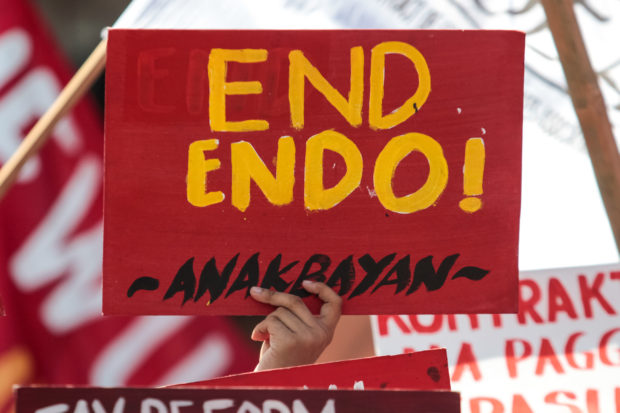
A MATTER OF PERSPECTIVE The order that President Duterte signed on Labor Day ends the
controversial contractualization scheme, according toMalacañang, but labor leaders say it does
not. —LEO M. SABANGAN II
The ball is now in the court of Congress to decide the fate of “endo” (end of contract), Sen. Francis “Chiz” Escudero said on Wednesday.
Employers who practice endo offer tenures shorter than six months, the threshold at which a worker must be made permanent and entitled to benefits.
Escudero made the statement a day after President Rodrigo Duterte signed Executive Order No. 51 prohibiting certain forms of short-term employment while allowing schemes, like seasonal or project-based jobs of janitors and maintenance workers, to continue.
The executive order (EO) basically reiterated existing policies on contracting, and the President called on Congress to amend the Labor Code of the Philippines for more substantive changes.
Labor groups said the EO offered nothing new and left millions of endo workers without benefits.
‘Political will’
Presidential spokesperson Harry Roque acknowledged that EO 51 was a reiteration of an existing law, but said it underlined the President’s determination to improve job security and deliver on his promises.
“What is new is the political will of the President to end contractualization,” he told dzMM radio.
Contractualization is a scheme used by employers to avoid regularizing workers.
Although Malacañang could by itself have ended the practice of endo, “it instead opted to let Congress set the direction,” Escudero said in a television interview.
Escudero, a member of the Senate committee on labor and employment, said “essentially, the Labor Code did not prohibit contractualization, but the executive department can regulate it or prohibit it outright.”
Malacañang’s choice
“The law gives the executive department the choice. Now the President, perhaps, wants to tell the Congress, ‘if you want to prohibit it, why don’t you prohibit it?’” the senator said.
Escudero noted that while the Labor Code had gone through a number of amendments in Congress, the provision on contractualization had not yet been touched.
“So, perhaps it is about time the Congress indeed [looked] into it and [decided] once and for all whether to [prohibit it] or we remain in the same regime we [have been] for the past 40 years, which is it is the choice of the executive,” he said.
The EO issued by the President, according to Escudero, may not have ended endo per se but “provided certain rules and set off a policy direction along the line,” which is a “big push to put an end to contractualization.”
Gov’t contractuals
Escudero, however, lamented that the government remained the “biggest employer of contractual employees, both national and local.”
He recalled that this started during efforts to streamline the bloated government bureaucracy.
Escudero said the government should lead by example and fix the problem of contracting in the public sector first, “before slamming the private sector.”
Unfair labor practice
Based on the 2016 Integrated Survey on Labor and Employment, there were 1.19 million nonregular workers in the country, including probationary, casual, contractual/project-based and seasonal workers.
Labor groups on Wednesday said that instead of putting an end to contractualization, the EO would only serve to promote the unfair labor practice.
The EO was based on the Department of Trade and Industry’s “win-win formula” meant to legitimize labor contracting since the task of regularizing workers would fall to third-party service providers, or manpower agencies, said Nagkaisa Labor Coalition spokesperson Rene Magtubo.
There is no security of tenure because when a principal employer cuts ties with the third-party service provider, “workers would automatically lose their jobs,” Magtubo said.
Compared with the fifth draft submitted by labor groups, the EO omitted the provision that would make direct hiring the norm in employment relations.
Because of the omission, the President “did not end precarious work arrangements, such as endo and abusive contractualization,” said Alan Tanjusay, spokesperson for the Associated Labor Unions-Trade Union Congress of the Philippines.
Campaign promise
Roque, however, said that with the signing of EO 51, the President fulfilled his campaign promise to stop the practice of endo.
“[H]e never promised to stop all contractualization even if you go back to his speeches and the statements he made during the campaign,” he said.
Roque noted that the President had said in his Labor Day speech that only Congress could address the labor groups’ call to prohibit all forms of contractualization. —Reports from DJ Yap, Jovic Yee, Christine O. Avendaño, Vince F. Nonato, Carla P. Gomez and the wires